What do you get when you combine a 2°C air temperature, a 2°C dew point, frozen ground with snow patches, and nearly-calm winds? Visibility under 100 meters on my commute to the office:
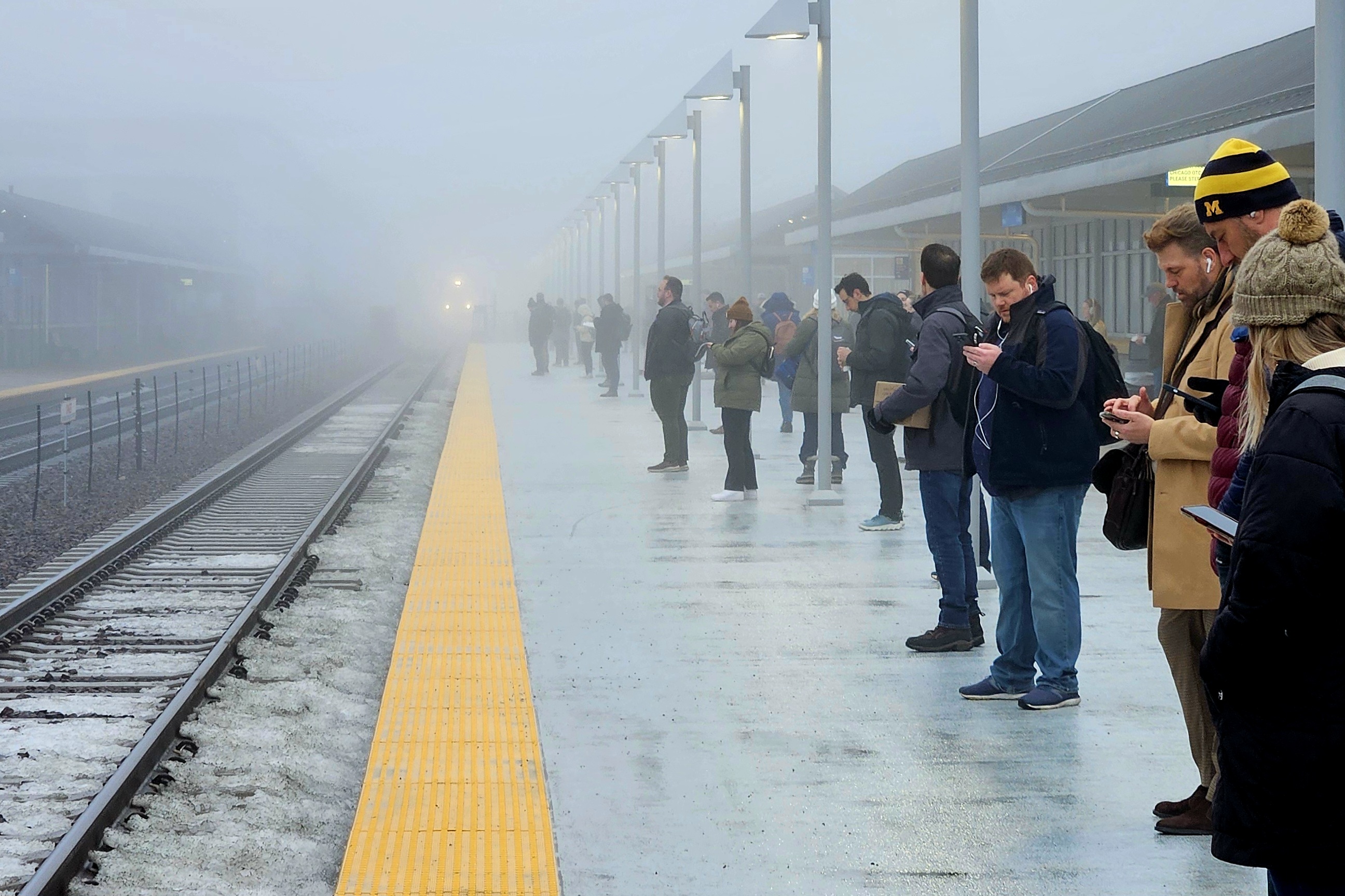
They say we may not see the sun until Wednesday. But they also say it'll be 7°C that day. March came early this year, it seems.
A weather pattern has set up shop near Chicago that threatens to occlude the sun for the next week, in exchange for temperatures approaching 15°C the first weekend of February. We've already had 43 days with above-normal temperatures this winter, and just 12 below normal during the cold snap from January 13th through the 22nd. By February 2nd, 84% of our days will have had above-normal temperatures since December 1st.
Thank you, El Niño. Though I'm not sure the gloominess is a fair exchange for it.
Elsewhere:
Finally, Minnesota-based wildlife photographer Benjamin Olson discovered that a mouse had moved into his car. So naturally, he set up a photo trap. And naturally, it's totes adorbs.
An Ottawa judge told the Crown Prosecution Service to return a suspect's mobile phones after prosecutors failed to unlock them after trying 175 million passwords:
The police seized the phones in October 2022 with a warrant obtained based on information about a Google account user uploading images of child pornography. The contents of the three phones were all protected by complex, alpha-numeric passcodes.
Ontario Superior Court Justice Ian Carter heard that police investigators tried about 175 million passcodes in an effort to break into the phones during the past year.
The problem, the judge was told, is that more than 44 nonillion potential passcodes exist for each phone.
To be more precise, the judge said, there are 44,012,666,865,176,569,775,543,212,890,625 potential alpha-numeric passcodes for each phone.
In his ruling, Carter said the court had to balance the property rights of an individual against the state’s legitimate interest in preserving evidence in an investigation. The phones, he said, have no evidentiary value unless the police succeed in finding the right passcodes.
The article helpfully describes how dictionary attacks work, but doesn't attempt to figure out how long it would take to brute-force them. (I'm not going to attempt that, either, but I expect it's a while.)
Looking out my 30th-floor office window this afternoon doesn't cheer me. It's gray and snowy, but too warm for accumulation, so it just felt like rain when I sprinted across the street to get my burrito bowl for lunch.
I do have a boring deployment coming up in about an hour, requiring only that I show the business what we've built and then click "Run pipeline" twice. As a reward for getting ahead on development, I have time to read some of these absolutely horrifying news stories:
Finally, Cranky Flier examines American Airlines' European operations and singles out its heavy dependence on Heathrow as a key reason why its fares trans-Atlantic are lower than other US carriers. Since I am using one of those really low fares to visit Germany next month, I'm OK with American keeping their fares low.
Last year continued the trend of getting back to normal after 2020, and with one nice exception came a lot closer to long-term bog standard normal than 2022.
- I posted 500 times on The Daily Parker, 13 more than in 2022 and only 6 below the long-term median. January, May, and August had the most posts (45) and February, as usual, the least (37). The mean of 41.67 was actually slightly higher than the long-term mean (41.23), with a standard deviation of 2.54, which may be the lowest (i.e., most consistent posting schedule) since I started the blog in 1998.
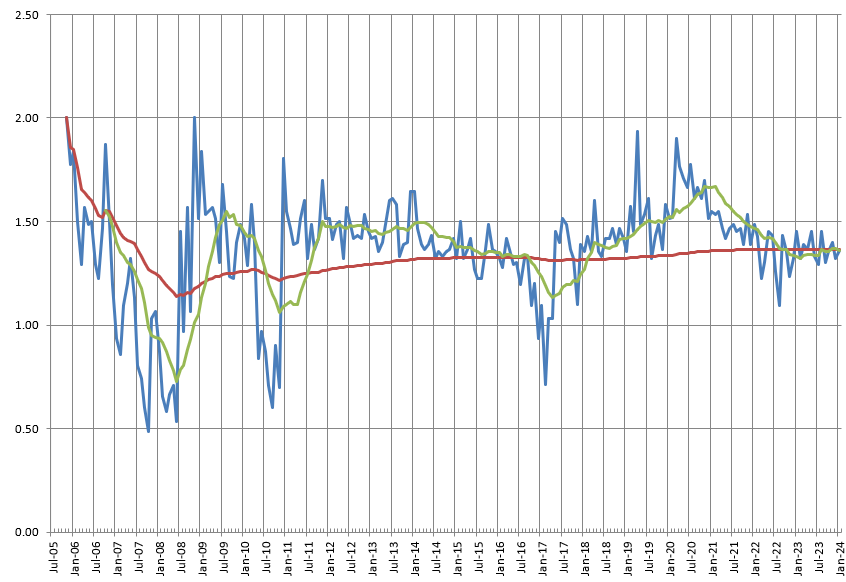
- Flights went up slightly, to 12 segments and 20,541 flight miles (up from 10 and 16,138), the most of either since 2018:
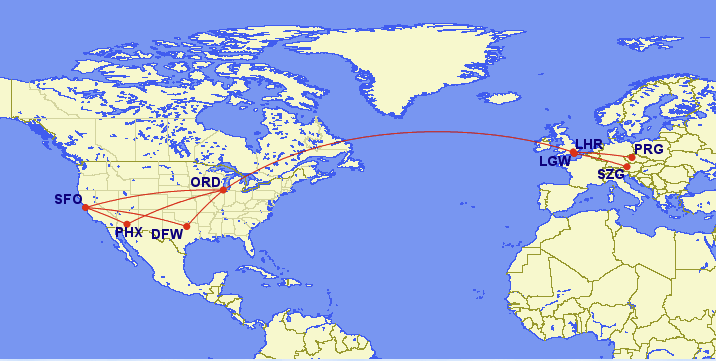
- I visited 5 countries (the UK, Czechia, Austria, Slovakia, and Germany) and 5 US states (California, Wisconsin, Arizona, Indiana, and Michigan). Total time traveling: 156 hours (up from 107).
- Cassie had more fun last year than 2022 as my team went from 2 to 3 days in-office (meaning more time at day camp). She got 372 hours of walks (up from 369) and at least that many hours of couch time.
- Total steps for 2023: 4,619,407 steps and 3,948 km (average: 12,655 per day), up from 4.54m steps and 3,693 km in 2022. I hit my step goal 341 times (327 in 2022), which wasn't bad at all. I also did my longest walk ever on September 1st, 44.45 km.
- Driving? I did several trips to Michigan in the summer, but still only drove 5,009 km (down from 5,925) on 87 L of gasoline (down from 144), averaging 1.7 L/100 km (136 MPG). That's the best fuel economy I've ever gotten with any car for a full year. I last filled up July 30th, and could conceivably go through January on what I've got left in the tank, but it's always best to keep your tank full in super-cold weather.
- Total time at work: 1,905 hours at my real job (up from 1,894) and 73 hours on consulting and side projects, including 640 hours in the office (up from 580), but not including the 91 hours I spent commuting (down from 103). How did I add 60 hours in the office while cutting 12 hours off my commute, I hear you ask? Simple: I live closer to the Metra than I used to, and the 6-10 minutes a day adds up.
- The Apollo Chorus consumed 247 hours in 2023, with 166 hours rehearsing and performing (cf. 220 hours just on the music in 2022). We had fewer performances and an easier fall season, which made a huge difference.
- As for media consumption, I'll leave that to its own post tomorrow.
In all, not a bad year. I hope the trends continue for 2024, though I do expect a few more blog posts this autumn...
Due to an odd combination of holidays, a use-it-or-lose-it floating holiday, and travel, I'm just about done with my first of four short work-weeks in a row. Not that there's anything wrong with that.
Of course, since I would like to finish the coding problem I've been working on before I leave today, I'll have to read some of these later:
- Josh Marshall thinks it's hilarious and pathetic that Rep. Lauren Boebert (R-CO), realizing she can't win against a Democrat in her own district, said she'll run in the next district over.
- Jennifer Rubin points out that while you can blame anyone you want for what's wrong with US politics today, ultimately it's the voters.
- Authors Bob Bauer and Jack Goldsmith argue for the repeal of the Insurrection Act, not just because of the XPOTUS.
- Climate scientist Brian Brettschneider has charted the perfect year-long road-trip across the US where it's always (normally) 21°C.
- A truck driver found himself trapped in an Indiana creek for six days until some fishermen discovered him. (He's OK.)
Finally, police and firefighters in Lancashire, England, are glancing about sheepishly this evening after reports of a fire at Blackpool Tower turned out to be...orange construction netting. They still managed to arrest one person for "breach of the peace," though for what The Guardian didn't report.
Cassie and I walked down to Christkindlmarket by Wrigley Field yesterday to meet up with some friends. I understand that the lakefront was completely fogged in, but a kilometer or so inland it just looked creepy:
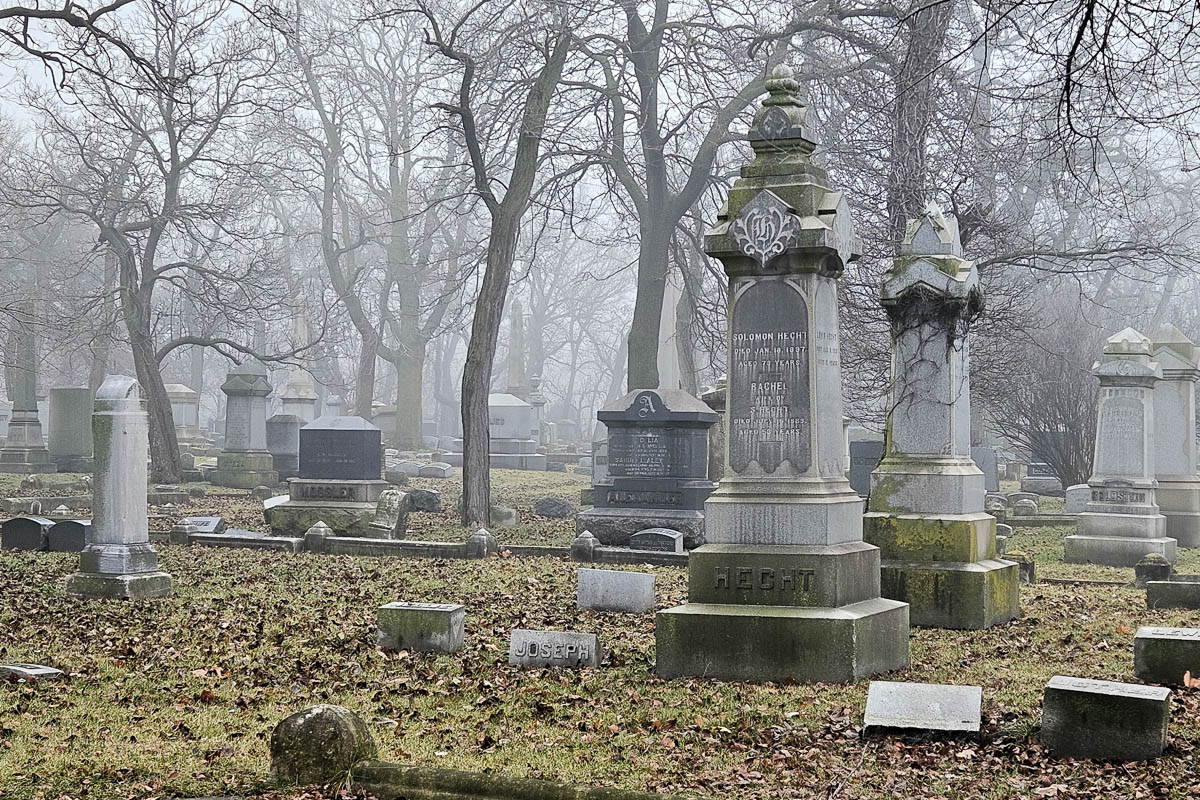
And on the walk home:
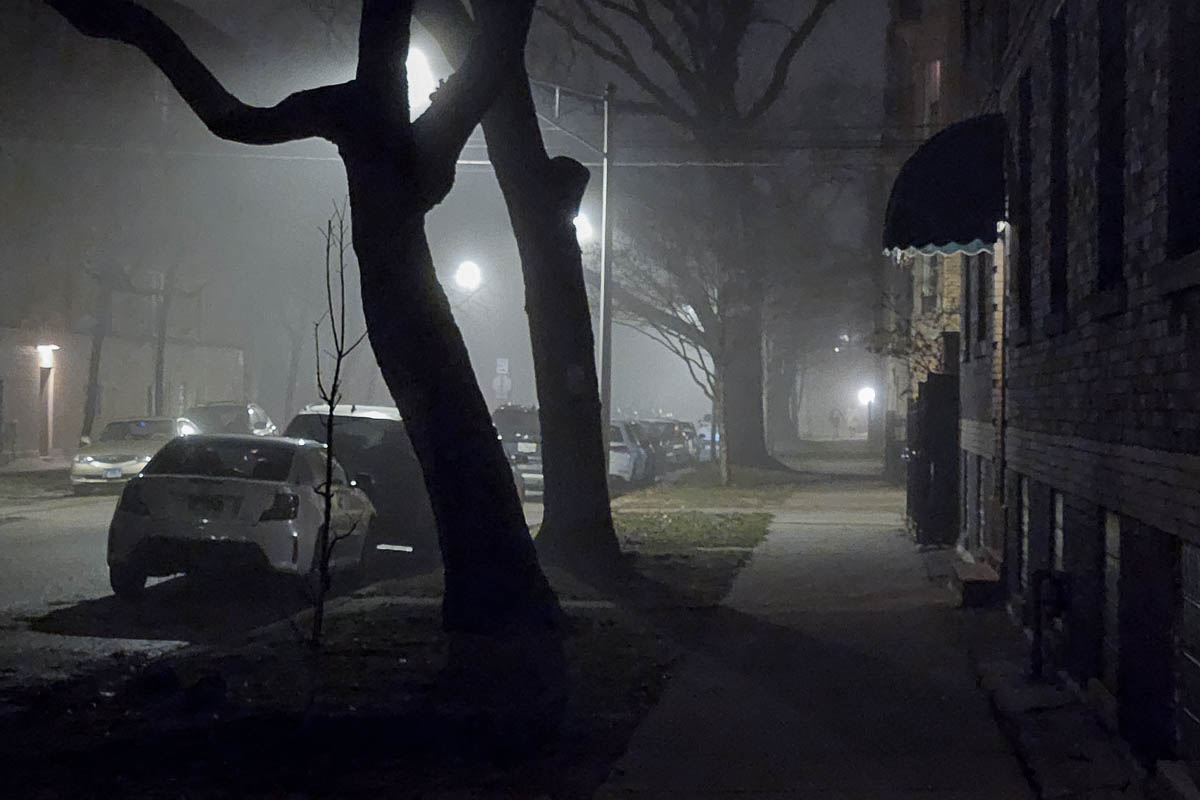
Right now at Inner Drive Technology World Headquarters, the sun has started peeking out, though the temperature-dewpoint spread hasn't gotten that much wider from this morning: 10.9°C with a dewpoint of 10.6°C. O'Hare still reports mist with increasing horizontal visibility but a very low (200 m) ceiling.
As soon as I deploy a bugfix to Weather Now, however, I'm taking Cassie on a 45-minute-or-so walk that will wind up at Spiteful Brewing. We might even sit outside, which is not the usual course of events on Erev Xmas.
As I wait for my rice to cook and my adobo to finish cooking, I'm plunging through an unusually large number of very small changes to a codebase recommended by one of my tools. And while waiting for the CI to run just now, I lined these up for tomorrow morning:
Finally, the CBC has an extended 3-episode miniseries version of the movie BlackBerry available online. I may have to watch that this week.
Frustrated with point-of-sale systems suggesting you tip the self-checkout machine 25%? You're not alone:
[T]raditional tipping patterns are being disrupted in unpredictable ways, raising workers’ expectations and making consumers grumpy. The feeling even has a name: “tipping fatigue.” A June survey by the financial services company Bankrate found that 66 percent of adults held a negative view of tipping. Forty-one percent said businesses should just pay workers better, and 32 percent said they don’t like being presented with those Goldilocks-like tablet screens suggesting three possible tips. Thirty percent said tipping culture was out of control, but only half as many (16 percent) said they’d be willing to pay higher prices to make tipping go away.
[N]either Amy Vanderbilt (1908–1974) nor Letitia Baldridge (1926–2012) ever knew today’s world, where you’re invited to tip at a retail checkout counter where the only service is to ring up a charge and perhaps bag a few items, or at a self-checkout machine where no service is provided at all. Tipping is in effect a new form of “junk fee,” with the only difference that paying or not paying is left to the customer’s tortured conscience. Even when you’re promised the proceeds will go to employees, the boss is clearly shifting some labor costs onto the customer, which is infuriating.
In D.C., many restaurants are introducing a 20 percent service charge, the equivalent of the French “servis compris”; European restaurateurs figured out long before their American counterparts that tipping culture is retrograde. But it’s still advisable to check with your waiter to make sure the money goes to staff and isn’t offsetting previous wages or benefits; D.C. law requires that restaurants disclose how such fees are spent, but there have been abuses.If the financial arrangement isn’t clear, then my own etiquette guide says you’re still stuck paying a 20 percent tip.
You still don't have to tip the self-checkout machine, though. It gets paid enough.
I just realized that my short complaint about the cold front that came through Saturday was The Daily Parker's 9,000th post since it re-launched as a modern, continuous blog on 13 November 2005. (I still maintain that it was a blog from its inception on 13 May 1998, but the term "blog" hadn't been coined yet.)
In the "modern" era, I've written a mean 495 and a median 505 posts per year, with a standard deviation of 66.3 (1.36, 1.4, and 0.27 per day, respectively).
For the 12 months ending November 30th, I wrote 500 posts at a mean of 1.37 per day and a median of 1.36 per day, standard deviation 0.06. At that rate I will hit 10,000 posts in almost exactly two years, on 10 December 2025.
Thanks for reading!